AI in hospitality is no longer a futuristic concept — it’s now actively transforming how restaurants, hotels and travel services operate.
This article explores how artificial intelligence is being used across the hospitality sector, from front desk service to back-end operations, and what its rapid growth means for industry professionals and guests alike.
Rise of AI in Hospitality
According to We Market Research, the hospitality AI market was valued at $90 million in 2022 and is projected to reach $8.12 billion by 2033, growing at a compound annual growth rate (CAGR) of 60%.
That projected leap — from $90 million to $8.12 billion — represents a more than 90-fold increase, underscoring just how dramatically AI is expected to reshape hospitality over the next decade.
And it's not just about market projections. On-the-ground adoption is already taking shape: 60% of hotels and 70% of travel agencies say they plan to adopt AI tools to improve service and streamline operations.
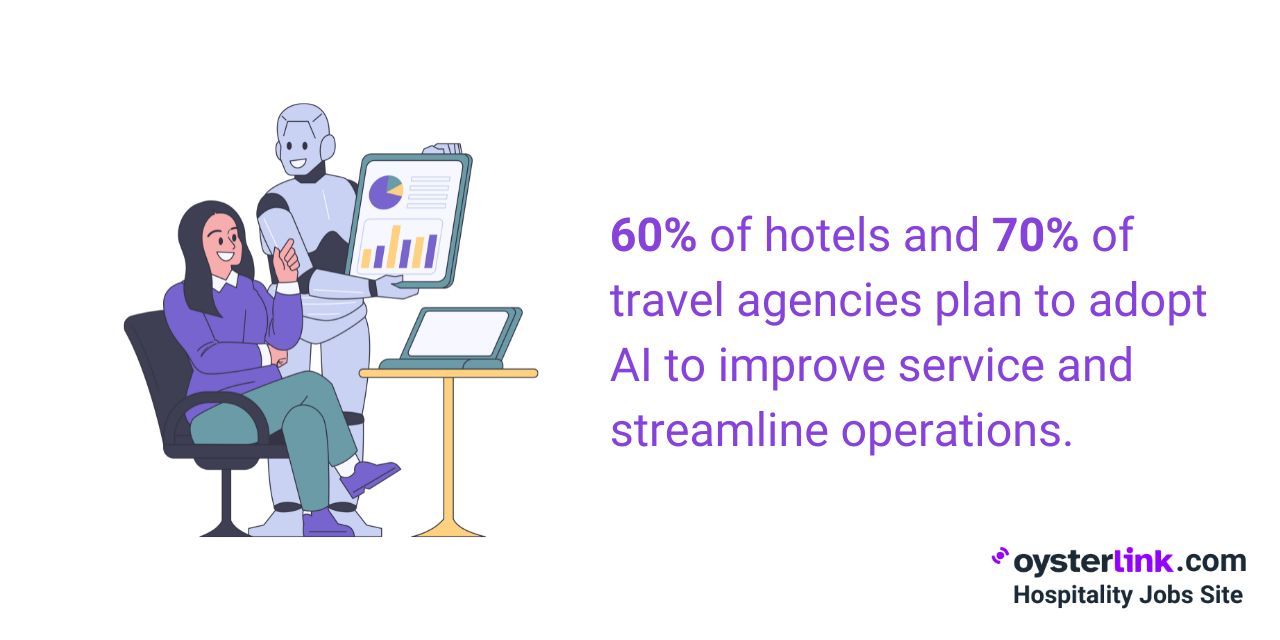
The appeal is clear: AI helps hospitality businesses operate more efficiently, respond to guests faster and unlock new revenue opportunities.
As Accenture notes, AI can potentially double annual global economic growth by 2035.
PwC estimates it could add $15.7 trillion to the global economy by 2030. But what does this mean in day-to-day hospitality settings? Here’s how the technology is already making an impact.
AI in Hospitality: Enhancing Guest Services
In hospitality, guest experience is everything. AI is helping brands meet rising expectations with faster service, smarter rooms and more relevant support.
Today, 58% of guests say AI improves their booking and stay experience, and 65% of travelers want their hotel tech to be more advanced than what they use at home.
Digital Concierge and Chatbots
Chatbots are a clear example of AI in hospitality, handling bookings, FAQs and local tips 24/7. About 70% of guests find them useful for simple tasks like getting the Wi-Fi password or scheduling wake-up calls, though most still prefer humans for complex issues.
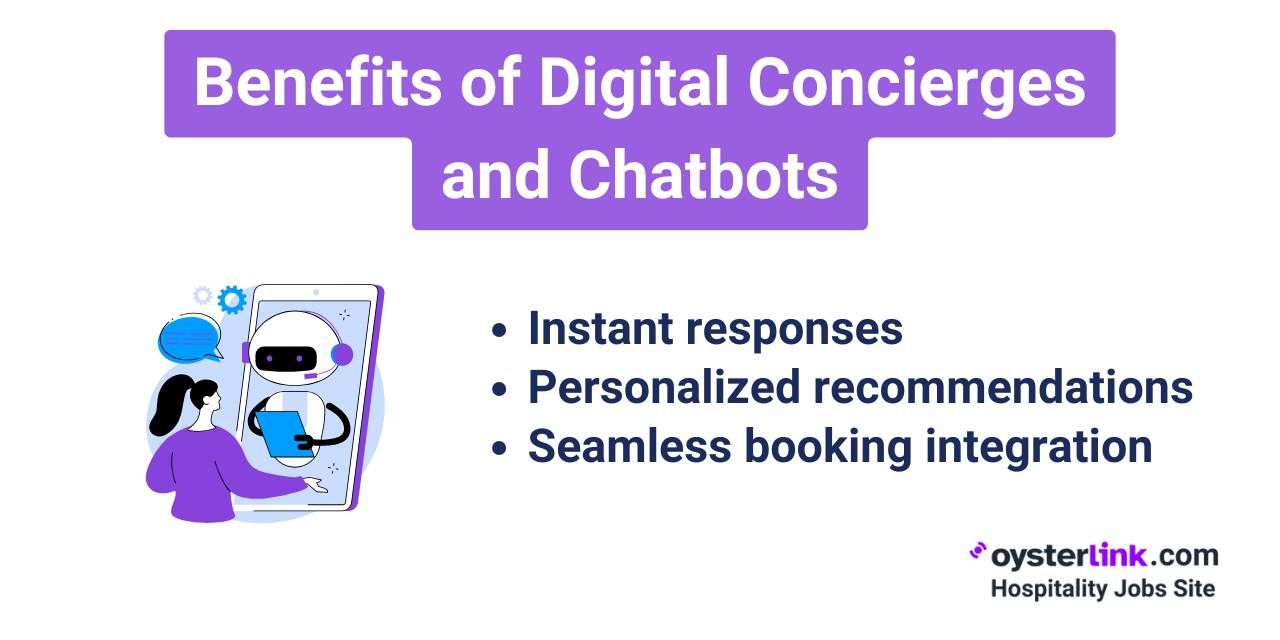
Voice-Activated Hotel Rooms
AI in hospitality goes beyond the front desk. In-room voice assistants let guests control lights, temperature and entertainment hands-free, boosting comfort and accessibility. They also reduce energy use and support faster, low-touch service.
AI in Hospitality: Revenue and Reputation Management
AI also supports the business side of hospitality — helping brands adapt pricing in real time and respond to feedback more efficiently.
Dynamic Pricing and Revenue Optimization
AI helps hotels stay competitive by adjusting prices in real time based on booking trends, market data and competitor rates. Tools like Duetto reduce manual work and improve forecasting, boosting occupancy and revenue.
It’s no surprise that 51% of hotel firms say the biggest benefit of AI will be improved operational efficiency over the next year.
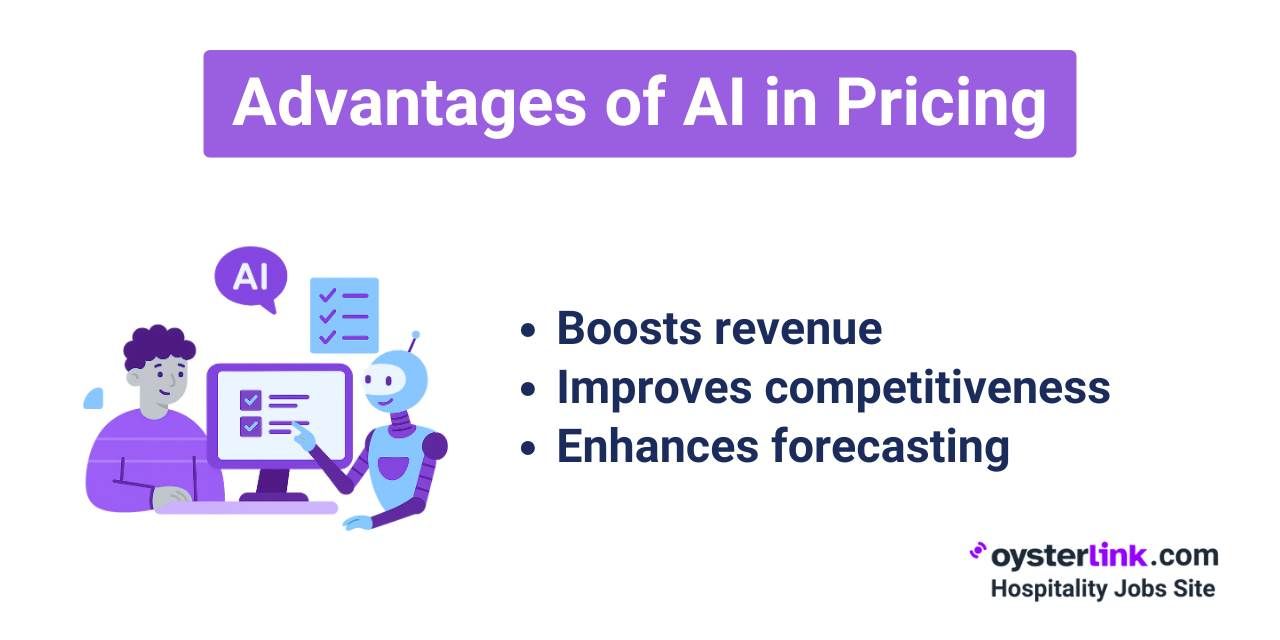
Automated Review Responses
Online reviews influence bookings — and AI helps hotels stay on top of them.
AI tools detect sentiment, flag concerns and draft personalized replies, saving time for staff while ensuring no guest feedback goes unanswered. This improves reputation management and builds trust.
These systems can also prioritize urgent feedback, enabling faster response to negative reviews before they escalate.
Some platforms integrate directly with review sites, syncing feedback management into one dashboard.
By acting on insights from guest sentiment analysis, hotels can identify recurring issues and improve operations over time.
AI in Hospitality Marketing and SEO
Digital visibility is crucial in hospitality, and AI is changing how marketing teams approach content and engagement.
Content and SEO Optimization
AI tools help hospitality brands create keyword-rich content, tailor messaging by user behavior, and improve search rankings—saving time while boosting traffic and conversions.
Here’s a TikTok video showing how AI-driven SEO automation is reshaping content creation and rankings across industries, offering insights that hospitality businesses can apply too:
Guest Engagement and Communication
Generative AI also powers personalized emails, promotions, and automated replies, making large-scale guest interaction faster and more targeted.
According to Deloitte, 52% of customers expect generative AI to be used in customer interactions, and 44% believe it will be used for guest engagement.
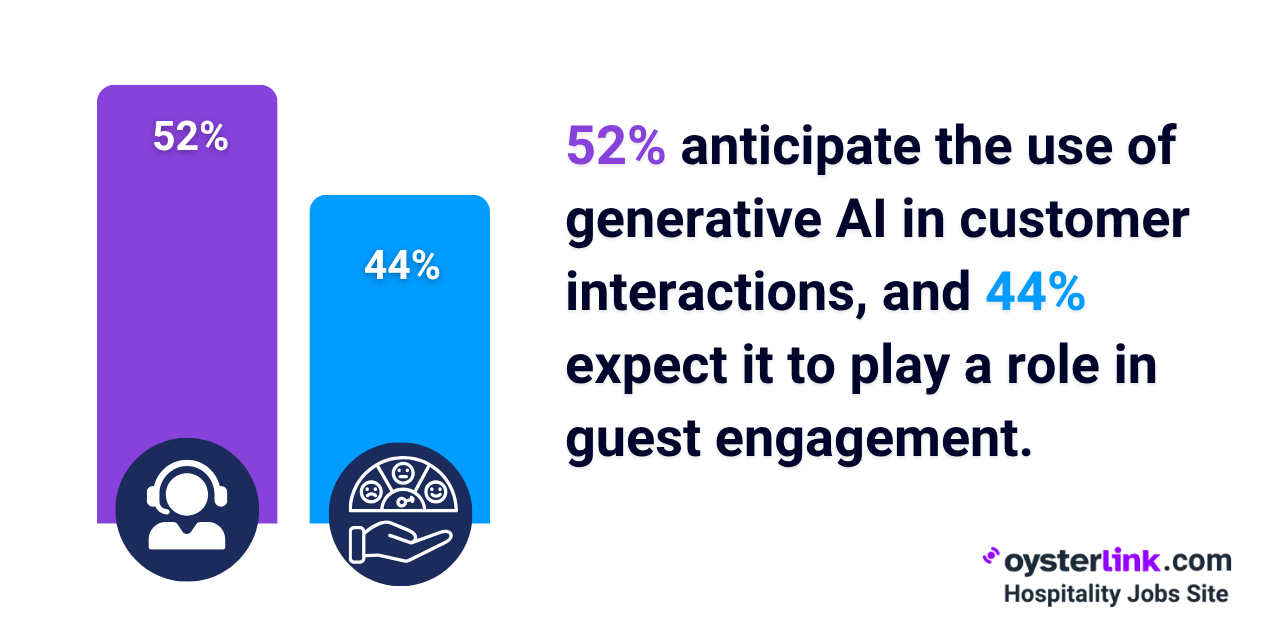
These trends reinforce how AI-driven content and communication strategies can influence both visibility and the overall guest experience, helping brands deliver faster, more personalized service across channels.
See also: Hospitality Social Media Marketing Trends in 2025
AI in Hospitality: Workforce Efficiency and Integration
Beyond guest-facing benefits, AI is improving how hospitality teams operate — by automating manual work and elevating staff performance.
Automating Repetitive Tasks
AI is simplifying backend operations by automating tasks like inventory, housekeeping schedules and staff coordination. This boosts efficiency and lets employees focus more on guest service.
For a broader look at how automation impacts work, check out this TikTok video that breaks down AI’s role in streamlining everyday tasks:
AI-Assisted Training and Hiring
AI is also transforming recruitment and staff training in the hospitality sector. AI-powered screening tools help identify the best candidates for roles, ensuring faster and more efficient hiring processes.
Virtual training programs use AI-driven simulations to improve staff retention through targeted training and enhance employee engagement and performance.
Security and Risk Management
Safety remains a top concern, and AI is stepping in. 68% of hospitality IT professionals say improving the physical safety of guests and staff is a key tech goal.
AI-powered surveillance systems and real-time monitoring tools can detect unusual activity, flag risks and support faster incident response.
Role of AI in Hospitality Workforce Efficiency
AI is transforming hospitality jobs.
According to the OECD, 14% of jobs are at high risk of automation, and McKinsey projects up to 800 million jobs could be displaced by 2030.
Both reports note that new roles will emerge in managing and supporting AI systems.
To stay competitive, hospitality businesses must rethink hiring, training and job design to keep people and technology aligned.
AI in Hospitality: Conclusion
AI is reshaping hospitality by improving guest experiences, streamlining operations and boosting revenue.
From chatbots to dynamic pricing tools, adopting AI is now essential for staying competitive.
Success depends on blending smart technology with personalized service — and those who adapt will lead the industry forward.
Looking to stay ahead in the industry? Explore more insights and tools for hospitality professionals on OysterLink, where you’ll find expert advice, industry trends and job opportunities to help you thrive in the AI-driven future of hospitality.
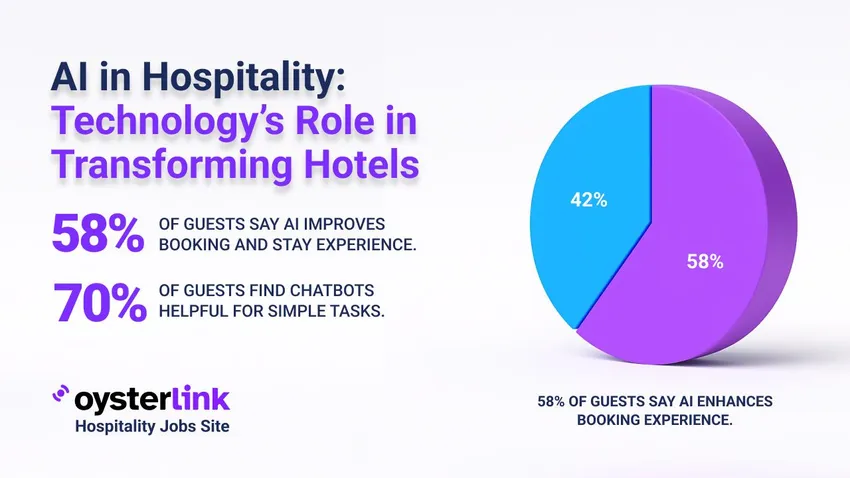








Loading comments...